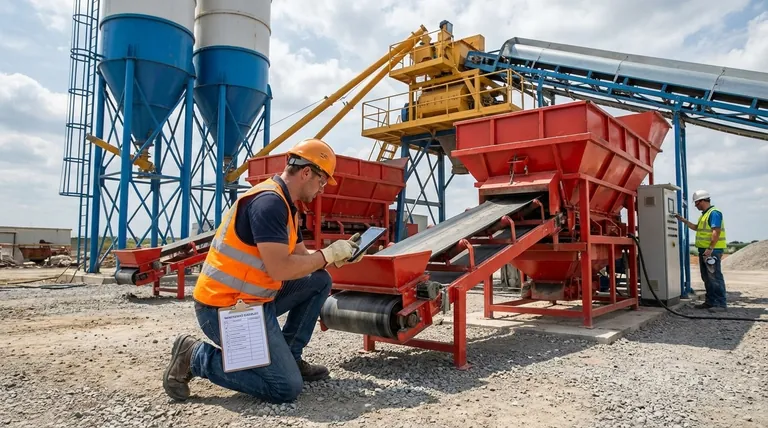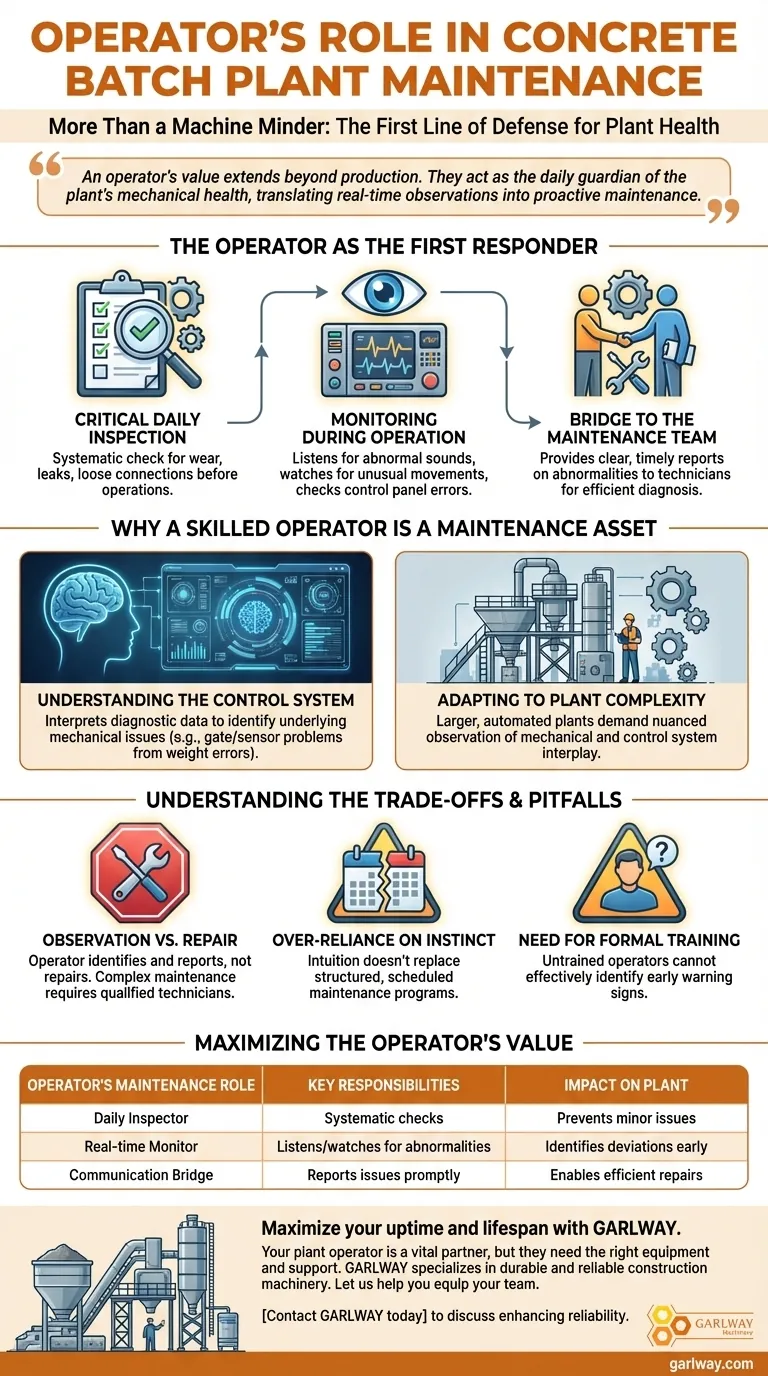The operator of a concrete batch mix plant is far more than a simple machine minder; they are the first and most critical line of defense in the plant's maintenance ecosystem. Their primary role is to conduct diligent daily inspections, continuously monitor the plant's operations for any abnormalities, and report issues immediately to prevent minor problems from escalating into costly breakdowns.
An operator's value extends beyond production. They act as the daily guardian of the plant's mechanical health, translating real-time observations into the proactive maintenance that ensures long-term reliability and consistent output.

The Operator as the First Responder
The operator has the most hands-on time with the equipment, placing them in a unique position to identify potential failures before they happen. This daily vigilance is a form of proactive, real-time maintenance.
The Critical Daily Inspection
Before operations begin, the operator's first task is a thorough inspection. This is not a cursory glance but a systematic check for signs of wear, leaks, loose connections, or damage to key components like belts, motors, and weighing systems.
This pre-emptive check ensures the plant is safe and ready for the day's work, catching issues that might have developed overnight.
Monitoring During Operation
While the plant is running, the operator monitors the entire production sequence, from aggregate feeding and weighing to the final mixing. They listen for abnormal sounds, watch for unusual movements, and check the control panel for error codes or inconsistent readings.
An experienced operator develops a feel for the machine's normal rhythm, making them highly effective at spotting subtle deviations that indicate a developing problem.
The Bridge to the Maintenance Team
The operator's role is not typically to perform complex repairs but to act as the crucial communication link to the dedicated maintenance team.
By providing clear, accurate, and timely reports on observed abnormalities, they enable technicians to diagnose and fix problems efficiently, minimizing downtime.
Why a Skilled Operator is a Maintenance Asset
The complexity of modern batch plants means that an operator's skill level directly correlates with their effectiveness in a maintenance context. A skilled operator is a significant asset that protects the machinery.
Understanding the Control System
Modern control systems automate mixing and ensure precision, but they also provide a wealth of diagnostic data. A skilled operator can interpret this data to identify underlying mechanical issues.
For example, if the system struggles to achieve the correct weight for an aggregate, it could signal a problem with a gate or sensor, which the operator can then flag for maintenance.
Adapting to Plant Complexity
Larger, highly automated plants demand more from an operator. Their understanding of the complex interplay between mechanical and control systems allows for more nuanced observation.
In contrast, simpler plants may require less technical skill, but the operator's role in basic visual and auditory inspection remains just as vital.
Understanding the Trade-offs and Pitfalls
While the operator is essential, relying on them exclusively for maintenance is a common and costly mistake. It's crucial to understand the boundaries of their role.
Observation vs. Repair
The operator's primary function is to identify and report, not to repair. Expecting operators to perform complex mechanical or electrical maintenance without proper training and tools is unsafe and inefficient.
Their observations should trigger a formal maintenance process executed by qualified technicians.
Over-Reliance on Operator Instinct
An operator's intuition is valuable, but it cannot replace a structured, scheduled maintenance program. Regular, planned servicing of key components must occur regardless of whether an issue has been observed.
The operator’s daily feedback should supplement and inform this schedule, not serve as its only trigger.
The Need for Formal Training
An untrained operator does not know what "abnormal" looks or sounds like. Without proper training, daily inspections become a pencil-whipping exercise rather than a valuable maintenance tool.
Investing in training ensures the operator can effectively identify the early warning signs of equipment failure.
Maximizing the Operator's Maintenance Value
To effectively leverage your operator as a key maintenance asset, align their responsibilities and training with your specific operational goals.
- If your primary focus is uptime and reliability: Empower your operator with a detailed daily inspection checklist and a clear, immediate protocol for reporting issues.
- If your primary focus is quality and consistency: Train your operator to interpret data from the control panel, spotting deviations that signal both quality issues and underlying mechanical problems.
- If your primary focus is long-term asset preservation: Integrate operator feedback directly into your scheduled maintenance plan, using their daily observations to guide preventative actions.
Ultimately, viewing the plant operator as an active partner in maintenance, not just production, is the key to unlocking the full potential and lifespan of your equipment.
Summary Table:
| Operator's Maintenance Role | Key Responsibilities | Impact on Plant |
|---|---|---|
| Daily Inspector | Conducts systematic checks for wear, leaks, and damage before operations. | Prevents minor issues from escalating, ensuring safety and readiness. |
| Real-time Monitor | Listens for abnormal sounds and watches for unusual movements during operation. | Identifies subtle deviations early, reducing unexpected downtime. |
| Communication Bridge | Reports abnormalities clearly and promptly to the maintenance team. | Enables efficient diagnosis and repairs, minimizing production delays. |
Maximize your concrete batch plant's uptime and lifespan with GARLWAY.
Your plant operator is a vital partner in maintenance, but they need the right equipment and support to be truly effective. GARLWAY specializes in providing durable and reliable construction machinery—including advanced concrete batching plants, mixers, and winches—for construction companies and contractors worldwide.
We understand that proactive maintenance starts with quality machinery. Let us help you equip your team for success.
Contact GARLWAY today to discuss how our solutions can enhance your plant's reliability and protect your investment.
Visual Guide

Related Products
- HZS120 Ready Mix Concrete Batching Plant Commercial Mud Cement Mixer
- HZS75 Concrete Batching Plant Cement Mixer Price Concrete Mixer Bunnings Mixing Plant
- HZS180 Ready Mix Concrete Plant for Foundations with Sand and Cement
- HZS35 Small Cement Concrete Mixing Batch Plant
- Portable Concrete Mixer Machine Equipment for Mixing Concrete
People Also Ask
- What are the advantages of a concrete plant? Achieve Consistent Quality & Efficiency for Large-Scale Projects
- How do you maintain a concrete batching plant? Maximize Uptime & Extend Equipment Life
- How does ready-mix work? A Guide to Efficient, High-Quality Concrete Delivery
- How does a ready-mix concrete plant work? A Guide to Efficient, High-Quality Production
- How to start a concrete plant business? A Step-by-Step Guide to Launching Your Venture












